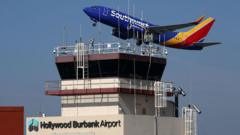Los Angeles has imposed a curfew for a second consecutive night following protests against U.S. immigration raids, resulting in numerous arrests and citywide unrest. Mayor Karen Bass attributes the turmoil to federal actions led by the Trump administration, calling for an end to the raids and highlighting the fear inflicted on the community. While some support the curfew as a necessary measure, critics label it an assault on democracy.
Curfew Continues in Los Angeles Amid Ongoing Protests Over Immigration Raids

Curfew Continues in Los Angeles Amid Ongoing Protests Over Immigration Raids
The city of Los Angeles remains under curfew for a second night as demonstrations against federal immigration raids escalate, culminating in hundreds of arrests and heightened tensions.
Los Angeles continues to grapple with unrest as a curfew remains in effect for a second night following a week of protests sparked by recent federal immigration raids in the area. The curfew took effect at 8:00 PM local time on Wednesday, with reports indicating that multiple individuals were arrested for violating the curfew soon after.
Since protests commenced on Friday, close to 400 people have been arrested in the city, including 330 undocumented immigrants and others for various offenses including assault on law enforcement personnel. Federal prosecutors have initiated charges against two men accused of using Molotov cocktails against police during the demonstrations. In response to the situation, 4,000 National Guard troops and 700 Marines have been dispatched to assist in controlling the unrest, with some troops now authorized to detain individuals until law enforcement can make an arrest.
The protests ramped up following the aggressive immigration actions of the Trump administration, with LA Mayor Karen Bass attributing the unrest to the heightened fear and panic these raids have caused in the community. In a statement on social media platform X, she articulated that the curfew aims to "stop bad actors" taking advantage of the situation, as she expressed concern that Los Angeles has become a testing ground for federal overreach into local governance.
The area affected by the curfew is relatively small, approximately one square mile in size. Mayor Bass indicated that the goal of the measure is to prevent vandalism and looting, having reached what she describes as a "tipping point." Police reported mass arrests earlier in the week linked to curfew violations and failure to disperse protesters.
Despite the curfew, protests continued in portions of the city, with officials noting that the unrest was confined to specific areas and was not indicative of widespread chaos throughout Los Angeles. U.S. Attorney General Pam Bondi remarked that the curfew had facilitated some stabilization in the city.
Meanwhile, the deployment of National Guard troops is aimed strictly at supporting federal personnel in their operations, lacking the authority for arrests. Maj. Gen. Scott Sherman clarified their role as protective, indicating that military personnel are assisting in immigration raids and have detained individuals at protests but will allow police to handle arrests.
Tensions have escalated between state officials and the Trump administration regarding this federal deployment. California Governor Gavin Newsom accused President Trump of undermining democratic processes with his military presence in the city, while the president has labeled the protests an "assault on peace and public order."
As the chaos over immigration policies continues to unfold, public opinion reflects a divided sentiment concerning Trump's deportation actions, with a CBS News/YouGov poll indicating a mixed outlook on his overall handling of immigration issues. The protests in Los Angeles signal ongoing challenges as communities confront the implications of federal immigration enforcement in their neighborhoods.





















